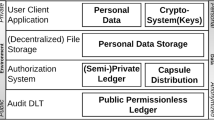Abstract
Digital identity is defined as the digital representation of the information known about a specific individual or organization. An emerging approach for protecting identities of individuals while at the same time enhancing user convenience is to focus on inter-organization management of identity information. This is referred to as federated identity management. In this paper we develop an approach to support privacy controlled sharing of identity attributes and harmonization of privacy policies in federated environments. Policy harmonizations mechanisms make it possible to determine whether or not the transfer of identity attributes from one entity to another violate the privacy policies stated by the former. We also provide mechanisms for tracing the release of user’s identity attributes within the federation. Such approach entails a form of accountability since an entity non-compliant with the users original privacy preferences can be identified. Finally, a comprehensive security analysis details security properties is also offered.
Preview
Unable to display preview. Download preview PDF.
Similar content being viewed by others
References
The Platform for Privacy Preferences 1.0 (P3P1.1) specification, http://www.w3.org/TR/P3P/
EPAL 1.0 Specification, http://www.zurich.ibm.com/security/enterpriseprivacy/epal/
Spantzel, A.B., Squicciarini, A.C., Bertino, E.: Integrating federated digital identity management and trust negotiation. In: Review for the IEEE Security and Privacy Magazine (2005)
Gruber, T.R.: A translation approach to portable ontology specifications. Knowledge Acquisition 5(2), 199–220 (1993)
Doan, A., Madhavan, J., Domingos, P., Halevy, A.: Ontology Matching: A Machine Learning Approach (2003)
Uschold, M., Gruninger, M.: Ontologies: Principles, Methods, and Applications. Knowledge Engineering Review 11(2), 93–155 (1996)
Maedche, A., Motik, B., NunoSilva, Volz, R.: MAFRA – a MApping FRAmework for distributed ontologies. In: Gómez-Pérez, A., Benjamins, V.R. (eds.) EKAW 2002. LNCS (LNAI), vol. 2473, pp. 235–241. Springer, Heidelberg (2002)
P3P Preference Exchange Language 1.0 (APPEL1.0), http://www.w3.org/TR/P3Ppreferences/
Alliance, L.: Liberty architecture framework for supporting privacy preference expression languages (ppel’s) (2003)
Liberty Alliance Project, http://www.projectliberty.org
Shibboleth, Internet2, http://shibboleth.internet2.edu
Cranor, L.F.: P3P: Making privacy policies more useful 1, 50–55 (2003)
Ashley, P., Satoshi Hada, G.K., Schunter, M.: E-P3P Privacy Policies and Privacy Authorization. In: Proceedings of the Workshop on Privacy in the Electronic Society (WPES) (2001)
Stufflebeam, W.H., Antón, A.I., He, Q., Jain, N.: Specifying privacy policies with P3P and EPAL: lessons learned. In: Proceedings of the Workshop on Privacy in the Electronic Society (WPES), p. 35 (2004)
Switchaai Federation, http://www.switch.ch/aai/documents.html
InCommon Federation, http://www.incommonfederation.org/
HAKA Federation Finland Federation, http://www.csc.fi/suomi/funet/middleware/
Overhage, S., Thomas, P.: Ws-specification: Specifying web services using uddi improvements. In: Aksit, M., Mezini, M., Unland, R. (eds.) NODe 2002. LNCS, vol. 2591, pp. 100–119. Springer, Heidelberg (2003)
Author information
Authors and Affiliations
Editor information
Editors and Affiliations
Rights and permissions
Copyright information
© 2006 Springer-Verlag Berlin Heidelberg
About this paper
Cite this paper
Squicciarini, A., Bhargav-Spantzel, A., Czeskis, A., Bertino, E. (2006). Traceable and Automatic Compliance of Privacy Policies in Federated Digital Identity Management. In: Danezis, G., Golle, P. (eds) Privacy Enhancing Technologies. PET 2006. Lecture Notes in Computer Science, vol 4258. Springer, Berlin, Heidelberg. https://doi.org/10.1007/11957454_5
Download citation
DOI: https://doi.org/10.1007/11957454_5
Publisher Name: Springer, Berlin, Heidelberg
Print ISBN: 978-3-540-68790-0
Online ISBN: 978-3-540-68793-1
eBook Packages: Computer ScienceComputer Science (R0)




